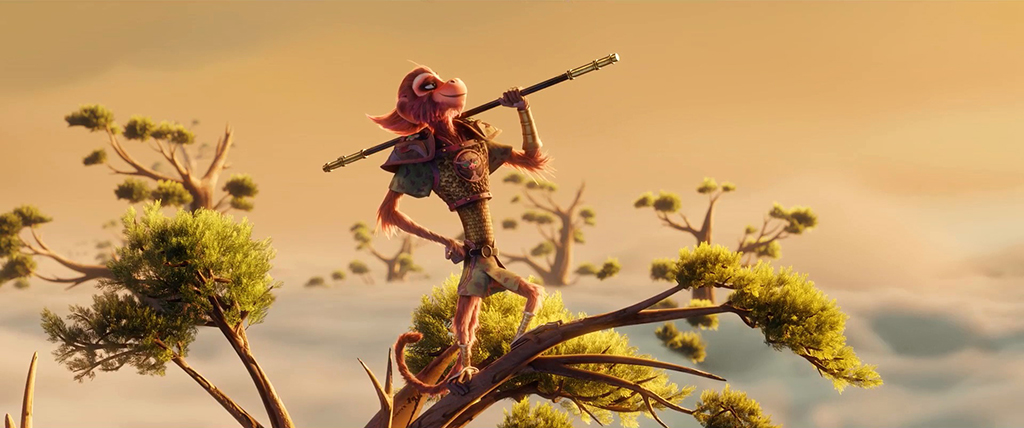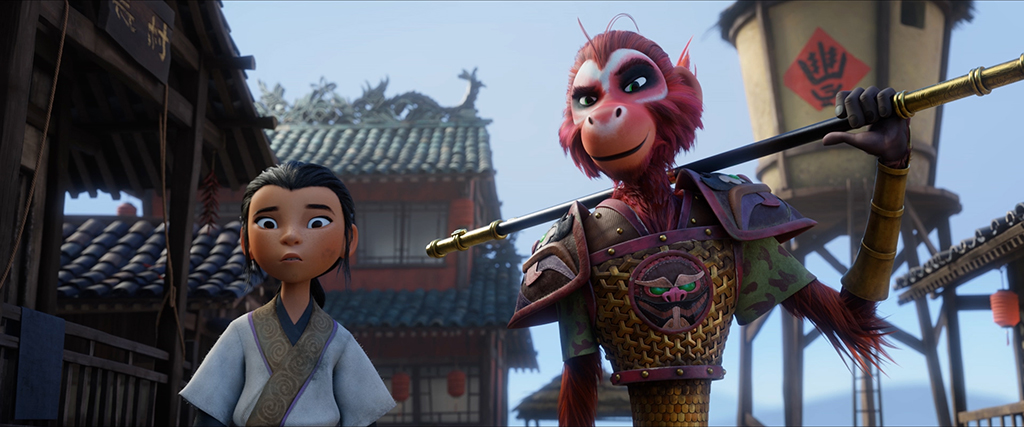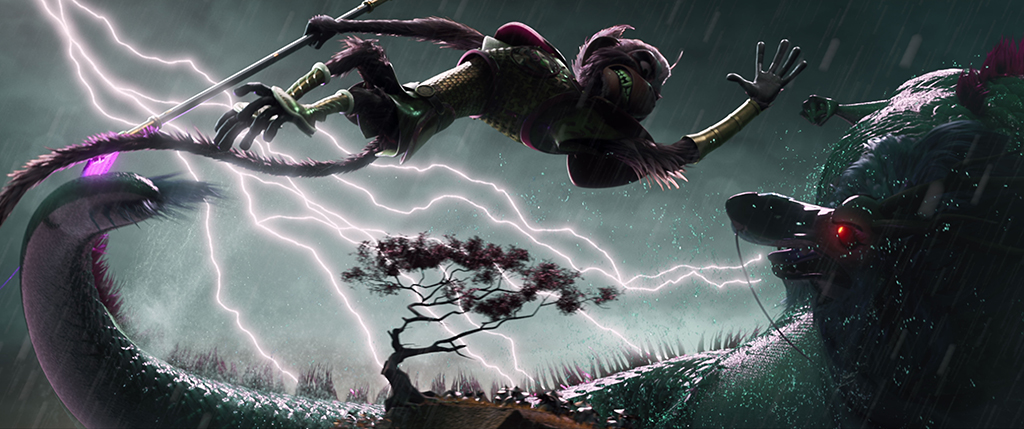By Kai Curry
NORTHWEST ASIAN WEEKLY

Monkey (Jimmy O. Yang) on top of the world, where he very much likes to be. (Courtesy: Netflix © 2022)
“I love it when people tell me what I can’t do.”
These are the words of the Monkey King, voiced by Jimmy O. Yang, in an animated version, also “The Monkey King,” premiering Aug. 18 on Netflix. This sums up Monkey’s entire attitude, wouldn’t you say?
There are two ways to look at the Monkey King and his search for immortality—but more, equality, with the gods—and it depends what version of the story you’re watching. He’s either a misfit trying to break into a place he doesn’t belong—how dare he?!—or he’s the person in all of us made to feel small, deservedly crashing through the glass ceiling—yay Monkey King!
“Obviously, ‘Journey to the West’ and the Monkey King have been around a long time,” Producer Peilin Chou told the Weekly. “I grew up with it. It’s a cultural icon, but there had not been a feature animated film that was global in scale in terms of the story being told”—until now. Netflix’s reach and the chance to work with executive producer Stephen Chow turned Chou onto this rendition of the beloved tale, pre-“Journey to the West,” Monkey’s origin story. Chou, known for “Abominable” and “Over the Moon,” liked the freedom that the animated genre gave to introduce new elements into the story, such as making Monkey’s “stick” (voiced by Nan Li) its own character.
Okay “stick” is not a very flattering term, but that’s part of what makes this inclusion funny, the continuous mention of “stick,” as well as the ongoing innuendo.
“You love my stick. Everyone loves the stick. No one appreciates the stick like I do,” the Monkey says after he steals “stick” from the Dragon King (Bowen Yang). Monkey, who has mood swings, then yells at the stick—“Quiet, Stick!”—because it’s interrupting something egotistical he’s doing. When Monkey continues to protest that he stole the stick fair and square, Dragon King purrs, “I don’t see a ring on it, honey.”
“We love that, since Monkey is a very solo character by design, this would be somebody that he could talk to and have a love/hate relationship with,” Chou explained (still talking about “stick” here). “Given that he’s somebody that’s very narcissistic and arrogant, we’re always looking for ways to help make him feel more likable that would inspire you to root for him.”
“Stick,” then, is incredibly important in this film, and definitely has its own persona. My only question is, with all of its magical powers, why is it that sometimes “stick” has to be retrieved and other times goes to and fro of its own volition? NVM. Another new addition to keep Monkey company, whether he wants company or not (he doesn’t) is Lin (Jolie Hoang-Rappaport), a poor girl seeking help for her poor village. Lin tags along with Monkey, who little by little promotes her from “insignificant pebble” to “teammate,” and maybe, finally, to friend, right about when Monkey gets sealed into a mountain for 500 years, which is where the movie wraps up.

Monkey (Jimmy O. Yang) begrudgingly takes on Lin ( Jolie Hoang-Rappaport) as a partner. “Stick” (Nan Li) on the other hand, is a must-have. (Courtesy: Netflix © 2023)
According to Chou, Lin was “a key element that was going to help us achieve our goals because as a new character, she’s entering this world for the first time. And so, we the audience can see the world through her and when something is weird and wild and crazy, she also thinks it’s weird and wild and crazy.” I agree that both “stick” and Lin are good foils for Monkey. However, I have to make a shout out, even if it reveals how geeky I am. There is already a show on Netflix that provides beaucoup foil for Monkey and that is “The New Legends of Monkey,” out of Australia. It is live action, and yes, it’s a bit old, but it has a young female “monk” character who is similar to Lin. There are also many similarities with the presentation of Monkey, who is arrogant and prone to doing everything himself, who only grudgingly works with others, and who can’t read.
In this animated version, Monkey’s illiteracy comes into play when the Dragon King (with some help from an accomplice who shall not be named) entices him into a fake peach garden, where the Monkey King hopes to find his immortality/equality with the gods. He eventually does, we know this. And this new version of the story does succeed in making Monkey loveable. Jimmy’s rendition is impeccable. I really can’t now think of Monkey any other way.
“We love Jimmy in this role,” said Chou. “Jimmy brought such a nuance to how he embodied the role that made you root for him and care about him, even when he’s being a total jerk…he really draws you in…”
This is very true. When we meet Monkey, he is but a babe without a home, an orphan, who doesn’t have any success making friends with a nearby tribe of “normal” monkeys. These monkeys “live in a world of rules and order” and don’t break them. They represent the status quo, which in some versions of the story is the preference, and they immediately disapprove of Monkey. In this version, though, Monkey is meant to soar, to push the envelope, to evolve. He comes up against the Dragon King and in short order, Wangmu, the Queen of Heaven, and of course, the King of Heaven, who Monkey wants to usurp or at least just get some dang validity.
Chou told the Weekly a charming story about Bowen Yang and the role of Dragon King. Turns out, “He had dreamed his whole life of being a larger-than-life villain in an animated film. From the time he was very young…he would act out and sing Disney villain songs and reenact their deaths,” which if you can imagine that—and I know you can—is hilarious. Bowen, then, was able to live his dream by playing Dragon King, so of course he put his all into the role. Dragon King was a bit of a hard sell for me, which is not a reflection on Bowen. Interpretations of this character often rub me the wrong way—I didn’t like him in “American Born Chinese,” either. Too slithery. I did think it was funny that in this version the aquatic Dragon King has a skin condition that inconveniences him every time he emerges from the water to try to catch Monkey.
“One of the first times [Bown Yang] stepped into the recording booth to voice the character,” Chou recalled, “You know, we were talking, he’s talking with his normal voice and then, we go to do the lines and he [emits] this deep, booming Dragon King voice and I was like, ‘Where did that come from?! That was amazing!’ And he was like, ‘I’ve been practicing since I was 5.’”
“The Monkey King”—this version—premieres Aug. 18 on Netflix.
Kai can be reached at info@nwasianweekly.com.


